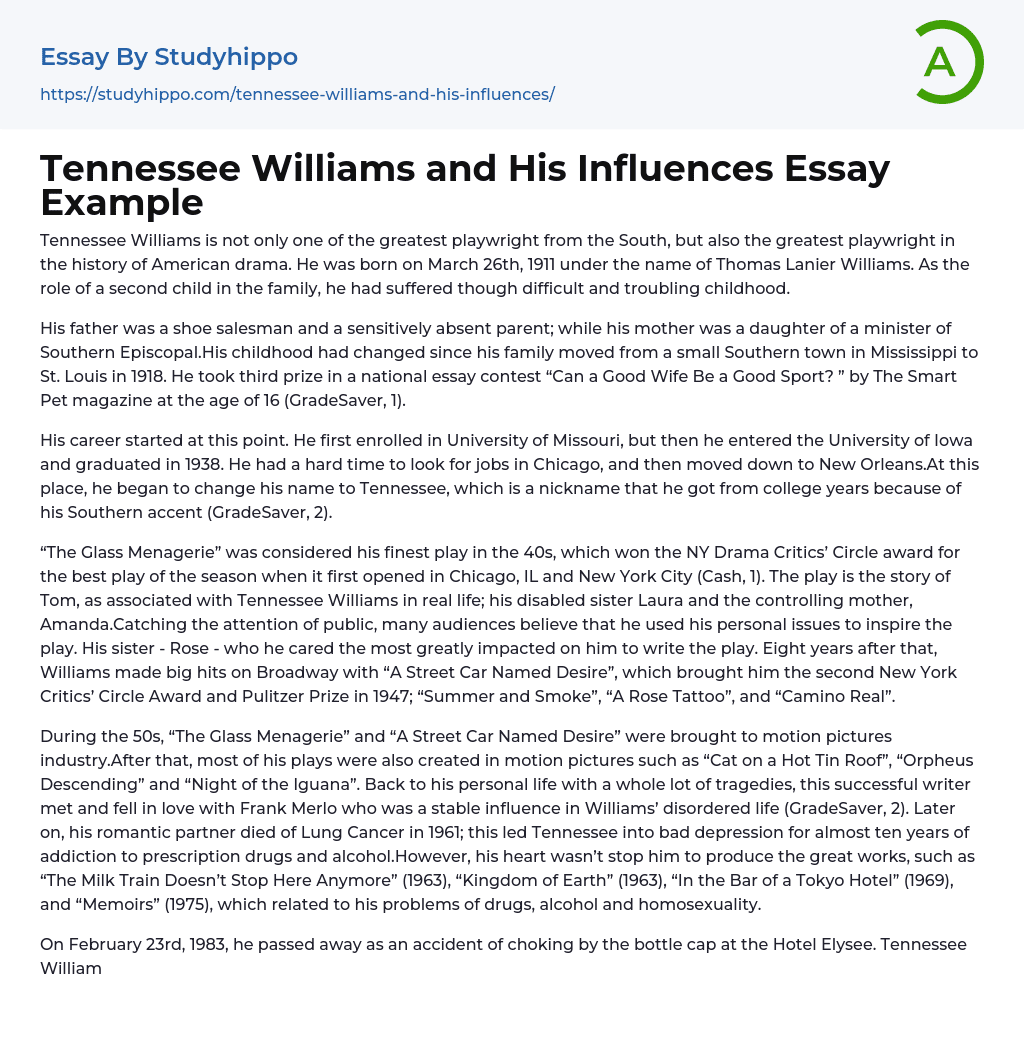Tennessee Williams is not only one of the greatest playwright from the South, but also the greatest playwright in the history of American drama. He was born on March 26th, 1911 under the name of Thomas Lanier Williams. As the role of a second child in the family, he had suffered though difficult and troubling childhood.
His father was a shoe salesman and a sensitively absent parent; while his mother was a daughter of a minister of Southern Episcopal.His childhood had changed since his family moved from a small Southern town in Mississippi to St. Louis in 1918. He took third prize in a national essay contest “Can a Good Wife Be a Good Sport? ” by The Smart Pet magazine at the age of 16 (GradeSaver, 1).
His career started at this point. He first enrolled in University
...of Missouri, but then he entered the University of Iowa and graduated in 1938. He had a hard time to look for jobs in Chicago, and then moved down to New Orleans.At this place, he began to change his name to Tennessee, which is a nickname that he got from college years because of his Southern accent (GradeSaver, 2).
“The Glass Menagerie” was considered his finest play in the 40s, which won the NY Drama Critics’ Circle award for the best play of the season when it first opened in Chicago, IL and New York City (Cash, 1). The play is the story of Tom, as associated with Tennessee Williams in real life; his disabled sister Laura and the controlling mother, Amanda.Catching the attention of public, many audiences believe that he used his personal issues to inspire the play.
His sister - Rose - who he cared the most greatly impacted on him to write the play. Eight years after that, Williams made big hits on Broadway with “A Street Car Named Desire”, which brought him the second New York Critics’ Circle Award and Pulitzer Prize in 1947; “Summer and Smoke”, “A Rose Tattoo”, and “Camino Real”.
During the 50s, “The Glass Menagerie” and “A Street Car Named Desire” were brought to motion pictures industry.After that, most of his plays were also created in motion pictures such as “Cat on a Hot Tin Roof”, “Orpheus Descending” and “Night of the Iguana”. Back to his personal life with a whole lot of tragedies, this successful writer met and fell in love with Frank Merlo who was a stable influence in Williams’ disordered life (GradeSaver, 2). Later on, his romantic partner died of Lung Cancer in 1961; this led Tennessee into bad depression for almost ten years of addiction to prescription drugs and alcohol.However, his heart wasn’t stop him to produce the great works, such as “The Milk Train Doesn’t Stop Here Anymore” (1963), “Kingdom of Earth” (1963), “In the Bar of a Tokyo Hotel” (1969), and “Memoirs” (1975), which related to his problems of drugs, alcohol and homosexuality.
On February 23rd, 1983, he passed away as an accident of choking by the bottle cap at the Hotel Elysee. Tennessee Williams’ life was just as much struggle as his play because most of his works was heavy impacted by changes in his life.Although he didn’t directly make over the contemporary ideas of Southern literature directly as a playwright, fiction writer, or poet, but as a Southerner, he contributed
his talent to find a strong voice for the South (Cash, 1). In addition, his play not only carried the extremes of human brutality and sexual manners, but also contained the violence and deaths. Moreover, the American theater’s audience received memorable characters in which described an unbelievable view of life as well as important portraits of the human situation in the South (GradeSaver, 2-3 ).Therefore, his wonderful works has been transferred from time to time with a great impact on society and audiences as well.
Work Cited
- Cash, Eric W.. "Tennessee Williams. " 19 Nov 2007 16 Sep 2008
- http://www. olemiss.edu/depts/english/ms-writers/dir/williams_tennessee/index. html.
- GradeSaver. "GradeSaver: ClassicNote: Biography of Tennessee Williams. " www. gradesaver.com. 16 September 2008. GradeSaver. 16 September 2008
- http://www. gradesaver.com/classicnotes/authors/about_tennessee_williams. html.




